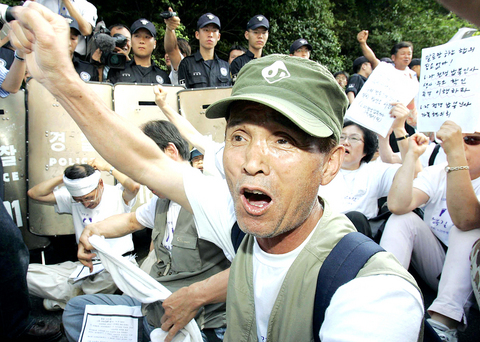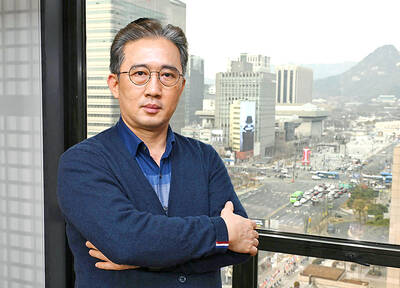North Korea said it wouldn't need any nuclear weapons if the US treated it like a friend as the isolated nation joined South Korea yesterday for high-level reconciliation talks shadowed by the international standoff over the North's nuclear ambitions.
"If the United States treats the North in a friendly manner, we will possess not one nuclear weapon," the North Korean delegation said, according to Kim Chun-shick, spokesman for the South's side.
The statement echoed a pledge by North Korean leader Kim Jong-il who met Friday with visiting South Korean Unification Minister Chung Dong-young and said Pyongyang could return to international nuclear disarmament talks as soon as next month if it gets appropriate respect from Washington.

PHOTO: AP
Chung, head of Seoul's delegation, yesterday urged the North to return to the nuclear talks in July, his ministry said in a summary of his remarks.
"The North Korean nuclear issue is a matter between the two Koreas as well as an international one," Kim Chun-shick quoted Chung as saying.
The North has stayed away from six-party talks aimed at persuading it to disarm since June 2004, citing "hostile" US policies, and declared in February that it had nuclear weapons. It has insisted that the nuclear standoff can only be discussed with the United States, and no breakthroughs on the issue were expected at this week's inter-Korean talks.
The two Koreas were instead focusing on aid and cooperative projects to bridge their divided peninsula, including cross-border trade and family reunions among Koreans separated since the end of the 1950-53 Korean War.
At the start of Wednesday's talks, the North requested food aid citing continuing shortages, Kim Chun-shick said. He declined to specify the amount but said it was on par with donations made in previous years.
On Saturday, the North requested 150,000 tons in fertilizer aid from the South, on top of 200,000 tons that it has already received this year. Seoul earlier this year declined to respond to a record request for 500,000 tons, citing previously stalled contacts with the North.
In related news, Kim Jong-il attempted to engage President George W. Bush directly on the nuclear weapons issue three years ago but the administration spurned the overture, two American experts on Asia said on Wednesday.
Writing in the Washington Post, former US ambassador to South Korea Donald Gregg and former journalist Don Oberdorfer expressed concern that Kim's November 2002 initiative was never pursued and urged Bush to respond positively to his current overture, made last week.
When Bush took office in 2001, US officials estimated Pyongyang had fuel for one or two nuclear weapons. Now, that estimate is up to at least half a dozen and, the authors said, "many believe their claim to have fabricated the weapons themselves."
Gregg and Oberdorfer said they visited Pyongyang in November 2002, after then-US Assistant Secretary of State James Kelly was there and accused the North of pursuing a secret program of enriching uranium for nuclear weapons.
Gregg and Oberdorfer said while in Pyongyang "we were given a written personal message from Kim to Bush."
Kim stated if the US recognized the North's sovereignty and provided non-aggression assurances "it is our view that we should be able to find a way to resolve the nuclear issue in compliance with the demands of a new century."
Also in the message, Kim further promised "if the United States makes a bold decision, we will respond accordingly," the authors wrote in an opinion piece.
They said they took the message to senior White House and State Department officials and urged them to follow up on Kim's initiative.
But the administration, then planning for the Iraq invasion, "spurned engagement with North Korea," said Gregg and Oberdorfer.

VAGUE: The criteria of the amnesty remain unclear, but it would cover political violence from 1999 to today, and those convicted of murder or drug trafficking would not qualify Venezuelan Acting President Delcy Rodriguez on Friday announced an amnesty bill that could lead to the release of hundreds of prisoners, including opposition leaders, journalists and human rights activists detained for political reasons. The measure had long been sought by the US-backed opposition. It is the latest concession Rodriguez has made since taking the reins of the country on Jan. 3 after the brazen seizure of then-Venezuelan president Nicolas Maduro. Rodriguez told a gathering of justices, magistrates, ministers, military brass and other government leaders that the ruling party-controlled Venezuelan National Assembly would take up the bill with urgency. Rodriguez also announced the shutdown

Chinese President Xi Jinping’s (習近平) purge of his most senior general is driven by his effort to both secure “total control” of his military and root out corruption, US Ambassador to China David Perdue said told Bloomberg Television yesterday. The probe into Zhang Youxia (張又俠), Xi’s second-in-command, announced over the weekend, is a “major development,” Perdue said, citing the family connections the vice chair of China’s apex military commission has with Xi. Chinese authorities said Zhang was being investigated for suspected serious discipline and law violations, without disclosing further details. “I take him at his word that there’s a corruption effort under

China executed 11 people linked to Myanmar criminal gangs, including “key members” of telecom scam operations, state media reported yesterday, as Beijing toughens its response to the sprawling, transnational industry. Fraud compounds where scammers lure Internet users into fake romantic relationships and cryptocurrency investments have flourished across Southeast Asia, including in Myanmar. Initially largely targeting Chinese speakers, the criminal groups behind the compounds have expanded operations into multiple languages to steal from victims around the world. Those conducting the scams are sometimes willing con artists, and other times trafficked foreign nationals forced to work. In the past few years, Beijing has stepped up cooperation

The dramatic US operation that deposed Venezuelan president Nicolas Maduro this month might have left North Korean leader Kim Jong-un feeling he was also vulnerable to “decapitation,” a former Pyongyang envoy to Havana said. Lee Il-kyu — who served as Pyongyang’s political counselor in Cuba from 2019 until 2023 — said that Washington’s lightning extraction in Caracas was a worst-case scenario for his former boss. “Kim must have felt that a so-called decapitation operation is actually possible,” said Lee, who now works for a state-backed think tank in Seoul. North Korea’s leadership has long accused Washington of seeking to remove it from power